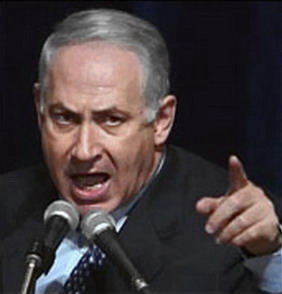Time is running out for the international community to halt Iran’s nuclear programme by peaceful means, the Israeli prime minister, Binyamin Netanyahu, told US defence secretary Leon Panetta in Jerusalem on Wednesday.

Sanctions, diplomacy and declarations of a willingness to take military action as a last resort had not yet convinced the Iranians to stop their programme, he said. “However forceful our statements, they have not convinced Iran that we are serious about stopping them. Right now the Iranian regime believes that the international community does not have the will to stop its nuclear programme.”
Netanyahu said earlier that although sanctions were hurting the Iranian economy, such measures had “yet to move its nuclear programme even a millimetre backwards”.
Panetta is the fourth senior US administration official to visit Israel in recent weeks as concern has mounted in Washington that Netanyahu is preparing the ground for a military strike in the coming months.
In an attempt to reassure Israel – and counter the robust support for military action pledged by presumptive Republican candidate Mitt Romney in Jerusalem earlier this week – Panetta told the prime minister: “We will not allow Iran to develop a nuclear weapon, period. We will not allow them to develop a nuclear weapon, and we will exert all options in the effort to ensure that that does not happen.”
The question of whether Israel will unilaterally strike against Iran’s nuclear sites in the coming months has returned to the fore after a period of relatively dampened speculation. There have also been fresh reports of a split between the Israeli political and security establishments over the merits of early unilateral action, following open opposition to such a move from former security chiefs.
In a series of television interviews as Panetta arrived in Israel from Egypt, Netanyahu said any decision would be taken by the country’s political leadership. But, he added, “I have not taken a decision”.
Following reports that senior defence officials, including military chief of staff Benny Gantz and Mossad chief Tamir Pardo, were opposed to Israel acting alone, the prime minister said: “In every democracy the decision-maker is the political echelon and the implementer is the professional echelon. That is how it always was and that is how it always will be.”
He said Israel had the right to defend itself. “Things that affect our fate, our very existence, we don’t entrust to others – not even to our best friends,” he said.
Gantz denied that he was behind the reports, saying: “None of these stories was released by me … I tell the political echelon what I have to say, and they listen.”
The Israeli military was prepared for a military strike, he said. “As we see it, ‘all options are on the table’ is not a slogan, it is a working plan and we are doing it.”
Earlier Panetta met his counterpart, Ehud Barak, and toured an Iron Dome battery near Ashkelon, close to the border with Gaza. Israel deploys the weapons against rockets and missiles fired from Gaza.
Panetta denied reports that the purpose of his visit was to share with Israel an operational plan drawn up by the Pentagon to stop the Iranian nuclear programme by force in 18 months, by which time the administration believes it will be at a critical threshold.









